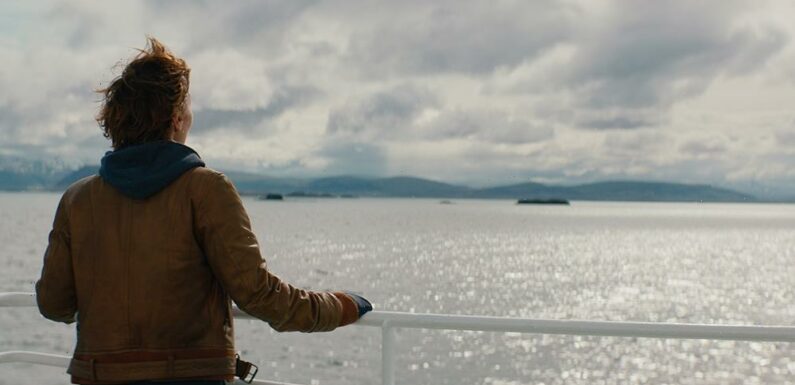
Playing in the prestigious New Directors’ section at San Sebastián, “Woman at Sea” (“Grand Marin”), a beautifully shot adaptation of the best-selling book of the same name, marks the feature directing debut of Russian actor Dinara Drukarova, who also stars in the film.
Sold by Loco Films, “Woman at Sea” is produced by Marianne Slot and Carine LeBlanc at Paris-based Slot Machine (“Melancholia”). Lensed in Iceland, the film captures the struggle for integration, and the search for self, all set in the film’s stunning but cold seascapes.
Drukarova’s character Lili follows in the footsteps of the book’s author, Catherine Poulain, who spent 10 years working on fishing boats in Alaska, as documented in the book.
“Woman at Sea” is about a woman working on a boat. I understand you live on a boat. Is there a connection?
I’ve lived on a boat for more than 20 years. My children were born on the boat. The man I love already lived on the boat. I like living on a boat because it is about the idea of nomadism. Casting off. It’s so romantic. Living on a boat is like you live in a very big fish that is alive. The water gives you energy and calms you. When I’m upset, I look at the river and say, ‘This will pass like the river.’ You don’t have neighbors. So I can do parties until the morning. Still ,the film was inspired by the book “Woman at Sea.”
How did the project begin?
Everything started from the book, “Woman at Sea.” When I read it, it blew my mind. It was something crucial. It changed my life. Sometimes a book or a painting gives you an answer to a question you are posing. I read it and said: ‘I want to do the film.’ For me, it was a metaphor, and a universal story of a human being that wants to abandon everything and go to the end of the world to find out who she is. I found the number of the author Catherine Poulain and met her. It was vital for me. It was something for me like I couldn’t live if I didn’t do it.
What inspired you in this true story?
Catherine inspired me. She’s wild. The story of her life. She’s a contemporary adventurer. She spent 10 years living in Alaska. Then the immigration services caught her and sent her back to France. When I went to see her in Bordeaux, I spent one evening with her and we drank two bottles of rum. I said whatever happens, I just want to thank you for writing this because it gave me what I needed to continue. Two days later she gave me the rights.
How was the making of the film, especially given the pandemic?
It was a long road. It was very complicated. My producer said it’s your first film, and it’s an adaptation, and you need to work with someone established. But I was upset by the resulting script, and said I had to write my own script. Then it was finding the finance. Presenting the project to film commissions. It’s like you are a prisoner and you have your last word.

Why did you film in Iceland when the story is set in Alaska?
In France the rule is if they finance it, 50% has to be in French. The original story is set in Alaska but I thought of Canada for this reason. But then COVID-19 arrived and the Indian reservoir we wanted to shoot at was locked. Then my producer closed shop. I proposed the project instead to Slot Machine. They said:”Let’s go to Iceland.” I said “Why not?” It’s like the end of the world. We spent five months in Iceland from January 2021. It was COVID time. Everything was closed and it was so complicated.
How did you develop the style of the film?
I wanted poetry in the images. Poetry is very important in cinema.
I wrote to DP Timo Salminen. He’s Finnish. He doesn’t really talk. He just says “yes” or “no.” But he got it. When I first looked at him, I said this is my man. I looked at his eyes. This was my alter ego. We first did a short film and it worked. I’m now preparing a documentary. It is a triptych with “Woman at Sea”. That will be the end, and I will then go and do something else. Maybe become a sailor. Life is too short to do just one thing.
How was it to star in the film and direct at the same time?
It was something that I did in a very special state of mind because it was extreme concentration for me to play and direct because I didn’t want to lose anything.
How do you feel about the result?
I wanted to defend the freedom of expression in cinema. Not to follow tradition. I don’t want to take people for stupid. The poetry and beauty of cinema and arts, and the questions cinema can pose to you was the most important thing to preserve and defend in making the film. It must be sincere. It had to be honest. Straight to the point. And it was for all my love to cinema. It was a crazy thing to live. I burned myself. I was in ashes after. Like a Phoenix but it permitted me to be reborn. I hope I made something that the public will feel with me. That it will have an echo in their hearts, and that maybe they will pose a question and have something very personal to think about.
Read More About:
Source: Read Full Article